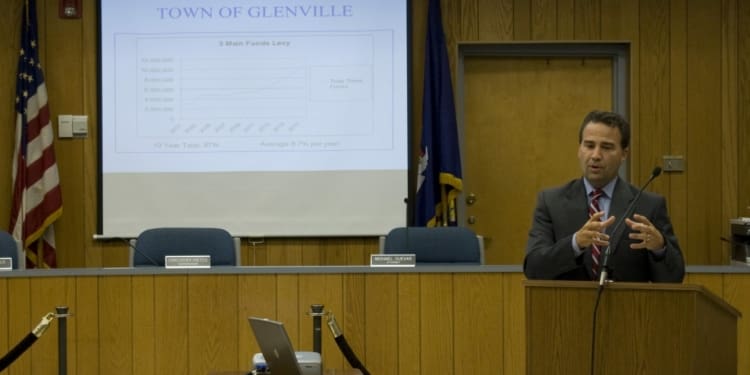As Glenville Supervisor Christopher Koetzle works on finishing his preliminary budget for 2012 he is trying to balance maintaining services while cutting costs. During the first of two budget forums, Koetzle presented the beginning workings of his budget for 2012. By the end of the month he plans to have the final version of the preliminary budget done. The crowd during the first budget forum on Wednesday,Sept. 7, was mostly town employees and Koetzle stressed trying to maintain services while controlling costs. A recurring theme throughout the forum was the Town Board trying to stay under the 2 percent tax cap spearheaded by Gov. Andrew Cuomo. Since the tax cap passed in the State Legislature, Koetzle has continuously said it would be difficult for the board to maintain services if it stayed within the 2 percent tax cap. Although, the all Republican Town Board couldn’t overturn the restriction with a 3 to 2 vote, which appears to be an option under consideration. “The challenges are really why stay under the tax cap and that is really a good discussion question,” said Koetzle. “One of the questions that I get sometimes, ‘Well, why stay under the tax cap? It is artificial.’ … That is something the board is going to have to talk about.” Raising costs of state mandates, health insurance and pension costs are falling alongside declining revenue expected for the town. In order to maintain services at the level residents are accustomed to, Koetzle said, they’d have to pay for it. During his presentation he stated out of every dollar from residents’ 2011 Real Property Tax, only 8.1 percent goes toward to the town. The remainder has 2.5 percent toward highway, 23.1 percent to Schenectady County and 66.3 percent to the school taxes (using 2010 school figures). For each 2 percent increase in the tax levy, he said, the average town resident would see a $10 increase to their tax bill. If Koetzle gave the department heads everything they asked for in their budgets for 2012, he said there would be around a 5 percent tax levy increase. “I know one dollar more (on a tax bill) is difficult … the thing we try to get across in the budget presentations is the majority of your tax bill is the county and the school,” said Koetzle. “For a very small percentage of your dollar you are getting services from your town you don’t get from the county.” Dave Gallup, dispatcher for the Glenville Police Department, said he didn’t believe residents understand how much of their tax bill goes toward the town. The majority of a tax levy goes outside of town services. Koetzle said discussing employees costs are a factor, which must be addressed in the budget.
“Wages are the biggest piece of our cost, there is no question about it,” he said. “For us not talk about wages, salaries and benefits we wouldn’t really be addressing the problem.” Although he didn’t want to appear on the attack toward town employees, because he said he hopes to work with the three unions in town to achieve additional cost savings. He said he understands the town is already short staffed. “We are not trying to paint a target on the employees at all, the services you provide are valuable and you do a fantastic job at it, but what we have to do is follow dollars, otherwise we are not addressing the cost,” said Koetzle. Diminishing fund balance usage continued to be a driving point for Koetzle, similar to the current budget. His plan toreduce fund balance usage has set 2017 to have the town not using allocating any fund balance toward the budget to help balance expenses. “Not a lot of towns are this dependent on this amount of money (from fund balance usage),” Koetzle said. “It is a dangerous practice.” Deputy Supervisor Alan Boulant said the town’s finance committee pointed the board to look at reducing fund balance usage and to whittle it down over time. Glenville has a higher residential tax burden than surrounding communities, which Koetzle said is 80 percent of the tax burden on residents. He said Niskayuna and Rotterdam have 60 percent of the tax burden on residents. Declining revenues are another driving factor behind the town’s push toward focusing on economic development. “We are very concerned that mortgage tax revenue continues to fall,” Koetzle said.
Ideas for shared services have also fallen through with both the county and Scotia. Most recently, county officials decided to go forward with a unified central dispatch plan excluding the town. Koetzle said the town was still open to discussions with the county, but county officials said the town officials appeared to not be interested in the plan anymore. Also, Scotia officials flirted with the idea of possibly consolidating the village police department with the Glenville Police Department, but after public backlash the village dropped the idea early. “We tried to work with the county and the village on many occasions for shared services,” said Koetzle. “The village has not been interested in many things.” Koetzle said he did get one suggestion so far, which is to stop drinking bottled water at Town Board meetings. “We got $3 to account for savings by going to tap,” Koetzle jokingly said.
Koetzle hosted the second budget forum at the Glenville Senior Center on Wednesday, Sept. 14. The town plans to post Koetzle’s budget forum slideshow presentation on the town’s website at www.townofglenville.org. If residents want to give feedback or suggestions on the budget they can call the town at 688-1200 and leave a message for Koetzle or email him at [email protected].
First look at Glenville’s budget woes
Leave Comment



